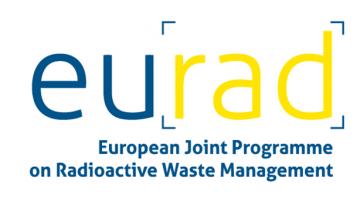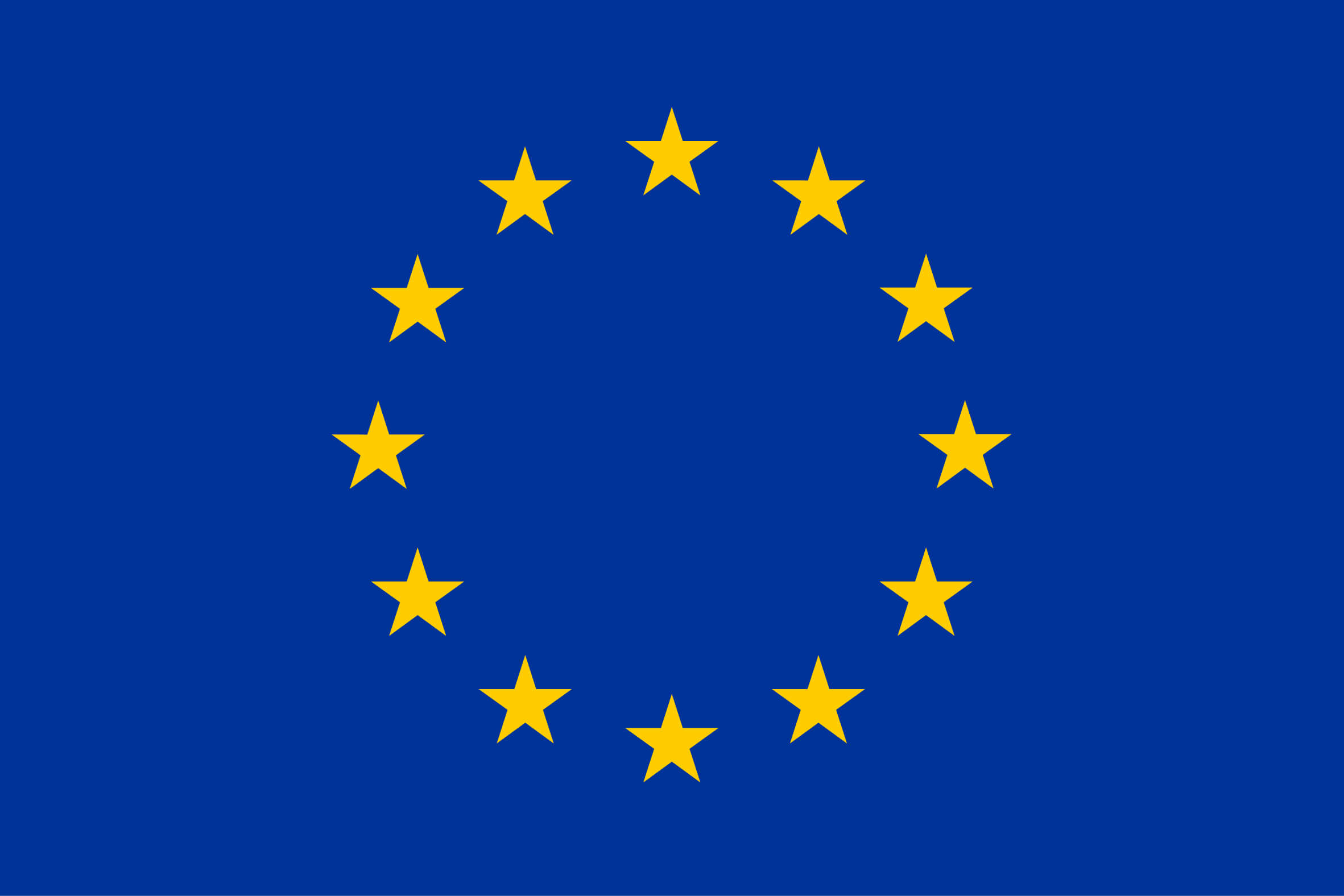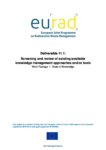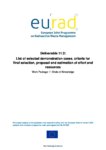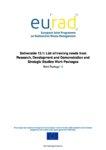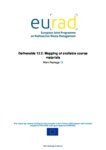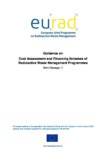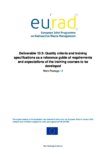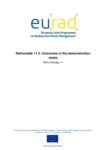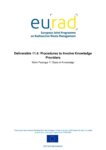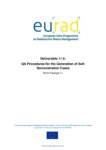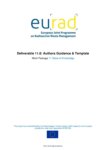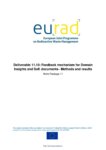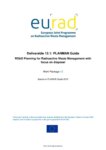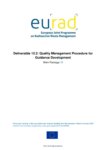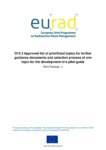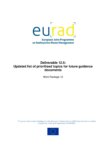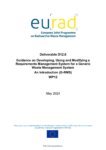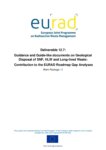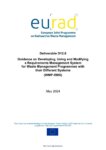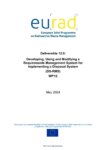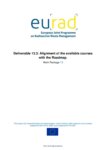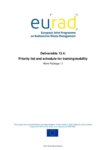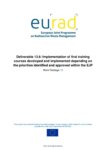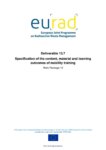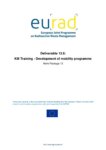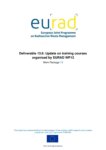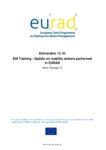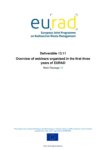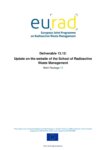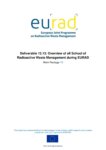EURAD – Knowledge Management
Project Dates: 1st June 2019 – 30 May 2024
Project Status: Finished
Project Website: https://www.ejp-eurad.eu/implementation/knowledge-management
Knowledge management is a EURAD(-1) Work Package (WP).
Overview
Project Dates: 1 June 2019 – 30 May 2024
Project Status: Finished
Project Website: https://www.ejp-eurad.eu/implementation/knowledge-management
Beyond RD&D and Strategic Studies, EURAD included activities to consolidate efforts across Member-States on Knowledge Management – this included access to existing Knowledge (State-of-Knowledge), guiding the planning and implementation of a RD&D plan of national RWM programme, and developing/delivering training/mobility in line with core competencies.
Objective
Knowledge Management was enabled by three permanent WPs:
- State of knowledge: Activities under this WP consisted of developing a systematic approach of establishing the state-of-knowledge in the field of RWM research. This was done on a stepwise basis: i) establishing of procedures to document the state of knowledge (SoK); ii) testing and improving these procedures on a few demonstration topics/sub-topics (of the Roadmap); iii) performing a review on existing tools/platforms and evaluating the added-value of establishing such a platform dedicated to provide access to SoK developed in EURAD.
- Methodological guidance: Activities under this WP consisted of developing a comprehensive suite of instructional guidance documents that can be used by Member-States with RWM programmes that are at an early stage of development with respect to their national RWM programme. Such WP pursued and complemented the work initiated with the PLANDIS Guide.
- Training/mobility: Activities under this WP consisted of developing a diverse portfolio of tailored basic and specialised training courses under the umbrella of a “School of Radioactive Waste Management”, taking stock of and building upon already existing initiatives (i.e. IAEA and NEA) and creating new initiatives to bridge the identified gaps. The end-users are defined as professionals and potential new professionals at graduated and post-graduated level from EU and non-EU countries (via the IAEA and NEA programmes), and in particular the next generation of experts. This WP also organised a mobility programme to provide access to dedicated infrastructures associated with the Mandated Actors/Linked Third Parties within EURAD. This work was carried out in close interaction with European networks having a recognised experience in training/mobility in the field of RWM.
Task Outcomes
State of Knowledge
One integral part of the EURAD KM Programme was the production of Domain Insight (DI) documents, which are short overview documents about a topic relevant to RWM, and State-of-Knowledge (SoK) documents. The writing and review of these documents was done by experts in their respective fields and the production process was coordinated by EURAD WP11 State-of-Knowledge (WP11 SoK) through preparation of guidance documents.
Methodological Guidance
Within Work Package 12, activities aimed to develop a comprehensive suite of instructional guidance documents that can be used by EU Member States with radioactive waste management programmes, regardless of their phase or level of advancement with implementation of geological disposal.
In the course of EURAD, based on a review made by WP12, it was decided to develop guidance on requirements management, because requirements management is recognised to be a very important activity for implementing waste management programmes / systems. The work package board together with the WP12 editorial board agreed to develop such guidance in a process with active involvement of end-users through a number of workshops and a training event. In this process, it was decided to develop three documents:
- a guidance document for generic waste management systems,
- a document describing in more detail the development of requirements for disposal systems with a discussion of the post-closure safety case and its interaction with requirements management,
- a guidance document for specific waste management programmes and with their different system systems, taking the stepwise implementation of these systems into account.
As all three documents are ‘stand-alone’ documents and each of them describing the same methodology (‘the way of thinking’) but each of them looking from a slightly different angle, there is some overlap between them on the more basic issues related to the requirements management methodology.
Additionally a guide on cost assessment and financing schemes of RWM programmes was developed. The main purpose of this guide was to provide information on the cost estimation in relation to the establishment, development, implementation and improvement of a waste disposal programme and to provide insight into the implementation of a financial scheme that ensures the efficient and sustainable financing of the programme.
Training/Mobility
In EURAD, WP13 and the School of RWM focussed its activities mainly on four main pillars. This includes two more pillars than initially foreseen in the ‘Description of Work’ for the EURAD programme. Despite this, and multiple hindrances by COVID-19, the School of RWM managed to book great results across all pillars.
This deliverable provides a general overview of all activities undertaken by WP13 in the frame of the School of RWM, followed by a critical reflection of the successes and points of improvements in the ‘Lessons learned’ section. Overall, the main objectives the School has set for itself at the start of EURAD were achieved. Feedback on the first two pillars, ‘Courses & Webinars’ and ‘Mobility Programme’, was highly positive. Similarly, activities the School undertook to support the EURAD PhD students has received positive feedback. However, each activities also has points of improvements going into the future, ranging from (very) minor (e.g. watch more closely over the quality of the training materials) to
major (e.g. setting up a PhD community as an end-user group with the EURAD community) improvements in each of its pillars.
The School of RWM has demonstrated remarkable success across most of its pillars, positioning itself as a valuable resource for end-users. It has proved itself to be a valuable resource in competence building with the European RWM community (and beyond). Furthermore, it actively contributed to EURAD’s KM Programme by ensuring heightened awareness of KM principles. All relevant activities remain accessible online, including Lunch & Learn recordings and mobility reports.
In conclusion, the School of RWM has laid the foundation of a successful hub for competence building in RWM in Europe through its four pillars. Thanks to its successes, and room for improvement, it is valuable to continue its activities going forward into future RWM-focused projects.
Closing words from WP Leader
State of Knowledge
WP11 was successfully completed, and all deliverables have been finalised. Despite initial setbacks faced by the KM WPs (and implicitly WP11), significant progress was made. By the end of the project, a substantial number of KM documents has been produced, which were well received by the RWM community. Having developed the necessary methodologies for efficiently capturing the SoK and collecting feedback, WP11 has set a solid foundation. As the number of KM documents continued to increase, the interaction with the EURAD community, end-users, and stakeholders has evolved positively. Our work has been disseminated at various international conferences and has generated recognition from well-established organisations such as the IAEA and NEA, with whom we have established strategic collaborations. Moreover, after the final months of the project, we are now pleased to announce the successful development and testing of a EURAD KM portal.
We are deeply grateful to all EURAD members who have contributed to KM. Whether it was writing and reviewing KM documents, identifying experts, providing feedback, participating in KM sessions or simply offering their support – their work and dedication have been extremely important.
Methodological Guidance
The new methodology of preparing guidance documents through end-users’ participation brings several positive results. The close end-user interaction enables quick reaction of the authoring team to adapt the guidance and to find and define a common language.
The networking of the people in RMS preparatory workshops is another valuable asset coming from this methodology.
Training/Mobility
Work in WP13 went really well and resulted in a great portfolio of training courses and a very successful Mobility Programme. All deliverables have been submitted in time. The D13.13 describes the main outcomes of WP13 achievements as well as evaluations of the trainings and mobility programme. Thanks to the very close interactions with the other EURAD KM WPs and close collaboration with the PREDIS training and mobility WP, WP13 was able to perform very well up until the end of EURAD.
The School of RWM acts as the executive body for all training and mobility actions that are organized within EURAD. The end-users of the School of RWM are defined as professionals and potential new professionals at graduated and post-graduated levels from EU and non-EU countries (via the IAEA and NEA programmes), and in particular the next generation of experts. All the work described here will be carried out in a close interaction with the European networks having a recognized experience in training/mobility in the field of RWM.

